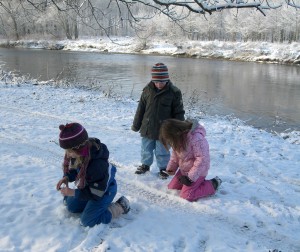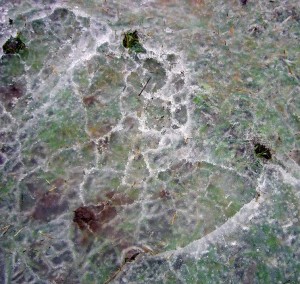by Hanna Vock
More and more Kindergartens have computers which are accessible for the children too. Sometimes even access to the internet is granted to the children.
Acceptance of this differs greatly: some kindergartens strictly disapprove of letting children use the computer in kindergarten, some will let children use the office computer occasionally, yet others have fully equipped computer rooms or a computer in each group’s room.
The debate on the pros and cons of the use of computers in kindergarten greatly resembles the debate we have seen many years ago when it was about TV and still many years earlier about reading.
The emergence of TV and reading in kindergarten allegedly bore the same dangers for children as now does the computer and the internet: it will ruin their eye-sight, turn the children into unhealthy couch potatoes, alienate them from real life and separate them from other children.
And these dangers have indeed become reality for many children. Except, that now we know: the problem is neither in the nature of these media themselves nor – in my humble opinion – in the “handling” of them, but it has much more to do with the fact that many children today live a poor childhood. And it is secondary whether they live in actual material poverty, which denies them access to many interesting things and experiences, or whether they live in affluence and constant stimulus satiation while nevertheless having too few truly positive and exciting experiences in their everyday lives.
When it comes to gifted children there is yet another aspect to be considered. Many gifted adults report that books were a major source of satisfaction for them since extensive reading gave them the intellectual input that they otherwise would not get from the people around them.
And while on the one hand it is comforting to know that they had this surrogate it is on the other hand sad they did not have enough friends and mentors. With both in a balanced proportion and complementing one another they would presumably have been much more fortunate.
So this means: books, TV, computer and internet are indispensible for gifted children, but they do not suffice. It is just as dreadful if children are “parked” in front of the TV for extended periods of time, consuming all kinds of nonsense, as it is if gifted children have to resort to media and the internet while lacking a continuous exchange with mentors who show interest. A mentor I would consider a person who is reliable and interested in the intellectual and emotional life of a child and who readily participates without being intrusive.
Exciting Childhood incl. the Computer
The widely spread non-species-appropriate husbandry of children in our society (see: Herbert Renz-Polster, Menschenkinder: Plädoyer für eine artgerechte Erziehung [A Plea for a Species-Appropriate Husbandry of Human Children] makes children uncritical and seducible for the rubbish in modern media.
And then arises the danger that children flee reality and turn to the computer.
If, however, parents and pedagogues manage to provide an exciting life, close to nature, with plenty exercise and experiences and if they accustom them to this early on – and if they can “spare” sufficient time and interest, they do not need to fear the new media.
For these lucky children the new media represent an additional opportunity and enrichment.
Conclusion:
A Kindergarten which operates in a way that provides stimuli and excitement in all areas of experience to the children can deal with the question of computers in kindergarten positively and with great ease.
Learning the Handling of the Computer – The Computer License
At the Kindergarten Botzeknööfe in the town of Kürten, Germany, the children can get a computer license. Two kindergarten teachers in this facility of three groups are in charge of this programme. In workshops with two or three children the participants learn:
-
- how to bring up and shut down the computer,
- how to open and close windows,
- the names of the different devices, peripherals and basic components like laptop, monitor, mouse, mousepad, keyboard, arrow keys …
- the starting of a game,
- navigation in the game.
At the end of the course every participant has to show that he can do all this, then he is entitled to hold the computer license and may from then on use the computer on his own.
However, there is a time limit. A kitchen alarm clock is set to half an hour. When it rings they have to quit. Sometimes there is such a run that a list is laid out in the morning where everybody has to sign up for his time on the computer. Then it is one after the other.
Oftentimes the alarm rings in the middle of a game. Then it is a matter of negotiation. If a child asks “Can I just finish playing this?”, it may be lucky – or not. Because the next child in line might answer: “No, it’s my turn now.”
What are the benefits of Computers in Kindergarten?
1. A Computer without internet access
is better than no computer at all. An offline computer can be used
-
- as a platform for computer games and educational programs on CD-ROMs
- as a typewriter
- as a design tool
- as a make-shift cinema when connected to a projector and
- for teaching the very bright and interested children early elementary steps of programming.
If the computer does not have a built-in CD/DVD drive, it is advisable to purchase an external drive so that you can also use the programme CD-ROMs mentioned (read-only, non-recordable CDs).
2. A Computer with internet access
is obviously even better, as it can also be used
-
- as a platform for games and educational programs that are available on the internet at no charge and
- as a search engine (encyclopaedia).
Which of these possibilities a kindergarten makes use of depends on the computer proficiency of the staff (or the pedagogically talented parents). Once more, their own enthusiasm in concert with some expertise are the best foundation on which to utilise these things to the children’s benefit.
Machine for computer games and learning programmes stored on CD-ROM
The children quickly learn to call up certain games and play alone or with several.
In view of the rapid development on this market, it makes little sense to go into individual games and media here. With the help of appropriate catalogues and overviews, but also through advice from more experienced users – often the children themselves – many possibilities can be used. More and more children have their own media at home, which they like to present in the day care centre.
The Typewriter
If the computer has no internet access, there should at least be a word processing application installed on it, and if there is not, one should be acquired. As an alternative some freeware (for example LibreOffice Writer) can be downloaded. In order to really use the computer as a typewriter a printer should be part of the setup, so that the children can look at the results of their efforts on paper and take the printouts home.
One might consider to check whether the child knows how to write all letters legibly before letting it use the computer as a typewriter. Making that manual skill a requirement could be an incentive for some children to practise their handwriting. However, other children whose fine motor skills are not yet fully developed but who are quite able to distinguish the phonemes of a word and identify all letters might be thwarted and discouraged unnecessarily. As always, the individual case must be considered.
The Creative Machine
Creating texts, editing images or drawing freely on the computer – these can be appealing if the kindergarten teacher is somewhat proficient herself and manages to convey her own enthusiasm to the children.
Practical Example: Snow Worlds Seen Through a Lens – An Art Project Involving Photography
The Cinema Machine
Watching a film together on a large screen (or on a white wall) in kindergarten and then discussing it afterwards (or even conducting a quiz on it) – that is certainly not the worst way to spend a rainy afternoon. Maybe that film is even self-produced?
I find films appropriate if they are not too long – 15 minutes are perfect. Then a discussion can follow or a game based on the film – and then maybe watch one more film.
The Jukebox
On the internet, for example on youtube.com, you can also find many children’s songs, often sung in the right pitch and tempo for kindergarten, sometimes with subtitles for the lyrics …, there are even karaoke versions, these are purely instrumental.
But even classical music, pop music, circus music and dance music can be found and can often be incorporated in current topics.
It is advisable to preselect bits, as some of the material offered on youtube cannot be recommended.
Learning How to Write Code
Gifted children with a significant mathematical talent and a strong ability to think logically may very well be apt to learn what writing code is all about, even at the age of 5 or 6 years. They can even learn how to write small simple algorithms themselves – and then get to experience their program actually running on the computer.
The computer language “Scratch” was released by the MIT (Massachusetts Institute of Technology) in 2007 and has been refined continuously by a group called “Lifelong Kindergarten”. (See article „Scratch (programming language)“ in Wikipedia).
The software allows the user himself to develop games, interactive stories, and animations and to choose the degree of complexity.
In other words:
ideal for beginners.
The children do however need some reading skills to work with the program. Writing skills are not that important in this case, since the user does not have to type a lot himself. Scratch is a visual computer language where ready typed code sequences are simply combined.
The manual will come up in English at first, but it can be reset to many other languages, as can the computer language itself.
In the beginning it is important to help the children find their way into the handling of the software. Then everything else is a matter of trial and error: Think, I’ll just do this – see what happens.
Is there a computer aficionado in your kindergarten or among the wider circles of your facility who is willing to help?
“Scratch” also provides the opportunity to exchange one’s own developments with a large international community.
The Search Engine / The Encyclopaedia
This is where the computer shows its quality as an educational tool at full scale. As early as in 1998 a colleague of mine showed the children an animated model of the planetary system on the screen after having tried in vain to demonstrate the motion of the planets around the sun using balls and oranges. The children were excited by the computer animation and so was I.
And the possibilities have expanded tremendously since.
What does a lady beetle eat? Let’s check on the internet. What does the Italian national flag look like? Take a quick look.
A recipe for baked apples? No problem. I heard of a kindergarten where the children found three recipes they liked, so they tried all three of them and then had everybody vote on their favourite one.
The major search engines like Google or Yahoo can of course be used or Wikipedia may be checked (in the presence of a kindergarten teacher). For the children to do research by themselves we recommend search engines that have been developed especially for children and that are therefore safe to use for children.
Safety on the Internet
It is vital to implement web filtering software or other appropriate parental control tools. Such programs prevent children from accidentally opening imperilling websites.
Such software is available for all major operating systems and browsers, easy to install and enable/disable for different users.
Published in German: February 2013/ version May 2021
Copyright © Hanna Vock, see Imprint
Translation: Arno Zucknick

















